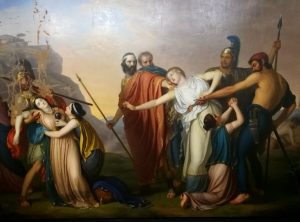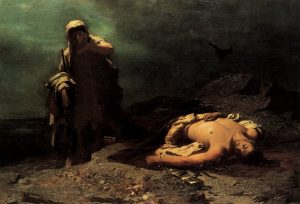The Burial of Public Peace
Antigone and Justice
by Pınar Çetinkaya

Antigone by Sophocles is one of the oldest tragedies, and it tells the story of Antigone’s search for justice under King Creon’s reign, as well as her and Creon’s tragic end. The play starts with a fight for the throne between the princes Polynices and Eteocles, who are Antigone’s brothers and Creon’s nieces. They kill each other in this struggle, and Creon ascends to the throne as the next in lineage, but declares Polynices a traitor and forbids his burial according to tradition. Antigone then decides to bury her brother at any cost because she believes that this declaration is against the divine law and that Polynices, like all dead people, deserves this right, so her fight becomes a rebellion against Creon’s laws.
The tragedy excites fear through Creon’s tyrannical rule, which sentences Antigone to death, and pity through the suicide of Antigone and all the other characters, excluding Creon. The central theme of the play is the maintenance of justice by the rule of law, but the controversial issue is who or what the law is founded on. Despite the fact that the law should be concrete and objective, in the tragedy, Creon declares himself the law through his proclamation about Polynices’ burial. Antigone’s opposition to Creon’s law stems from his unjust attitude towards Polynices since the divine rule of burial should not be violated by anyone’s personal judgement, including Creon’s. Creon also reinforces this injustice by labelling Antigone a rebel who must be punished so that he can impose his rule and sentence. The play therefore brings forth a discussion over justice and the abuse of power.
Authoritarian rulers, like Creon, abuse their power for their own benefit rather than for the good of society, and they begin to regard the entire state or country as their personal property. This type of regime damages the core values of government and democracy including justice, equality, and human rights, which contribute to a stable society for individuals. While the chorus that symbolizes the common sense of the society and the blind prophet, Tiresias, attempt to warn Creon of the fact that his actions would be disastrous, he disregards their warnings because he is completely arrogant and wishes to demonstrate his superiority over Antigone’s disobedience. Thus, he becomes a tyrant who leads society to chaos by insisting on his arbitrary punishment.
If the rule of law belongs to a single person or the ruler in society, the ruler’s wrong decisions can ruin the sense of justice or cause injustice. As a result, either an oppressed society arises, in which most rights become meaningless, or a chaotic order appears, in which everybody aims to secure his or her own justice as Antigone does and triggers unrest in society. Therefore, Antigone emphasizes that justice is one of the most important ideas at the heart of society for both the state and individuals to preserve peace and cannot be predicated on the arbitrary will of particular individuals which might result in a social tragedy.

